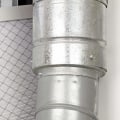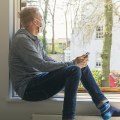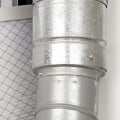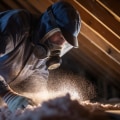When used correctly, air and HVAC filters can help reduce airborne contaminants, including viruses, in a building or small space. Cleaning or filtering air alone is not enough to protect people from COVID-19. The most common type of household filters at the moment are HEPA filters. These are designed to improve indoor air quality by physically removing small particles of matter that may be floating, such as dust, pollen and pet dander. These are all things that occur naturally, but can aggravate people's allergies if they inhale them. Disinfectants are designed to kill bacteria, viruses, mold or fungal spores that may also be floating.
The most common type of disinfectant at the moment is UV light devices. Ozone generators alter the standard oxygen molecule to have three atoms instead of just two. The three-atom molecule is called ozone, not oxygen, and it interacts with its environment differently than does the normal air we breathe. Air purifiers that use HEPA filters, UV light or ionizers are OK. However, inhalation of ozone can cause coughing, throat irritation, shortness of breath and other problems, even in healthy people.
Ozone can even cause lung damage, so local weather authorities sometimes issue ozone alerts. Please note that unless you have someone with an active COVID-19 infection in your household, you will not have any sources of coronavirus to reduce or filter with either of these methods. Therefore, you will only change the air quality inside your home in other ways. Let's say I visit you at home and I don't know if I have COVID-19 yet. If I sneeze on you from just two feet away, and neither of you is wearing a mask, then your risk of exposure will definitely increase, even if you have an air purifier nearby. But if you live alone and you are the only one there, the likelihood of contracting the coronavirus from the air in your own home is practically nil.
COVID-19 is not expelled by itself; it has to stick to something else to travel, such as mucus, a respiratory droplet, or a piece of dust in the environment. A HEPA filter doesn't kill the COVID-19 virus, but items that can carry the virus stick to the filter so they can't circulate in your living room. So yes, HEPA filters can trap particles containing coronavirus. People expel respiratory fluid droplets, saliva, and possibly viruses into the air when breathing, coughing, and talking. Even if the water in the drop evaporates, the droplets contain salts, proteins and other materials in addition to any viruses, which means that the remaining particles are usually a few microns in size, making them quite easy to trap with a HEPA filter. Researchers led by intensivist Andrew Conway-Morris from the Division of Anesthesia at the Faculty of Clinical Medicine at the University of Cambridge evaluated the ability of air filters to remove inactive particles in carefully controlled environments.
They found that when the filters were turned off, the air in both rooms contained detectable amounts of other pathogens that cause infections in hospitals such as Staphylococcus aureus, Escherichia coli and Streptococcus pyogenes. Surprisingly, they did not find many viral particles in the air of the intensive care room even when the filter was turned off. Meanwhile its air quality sensor uses a laser to monitor air particles with instant feedback on the front digital display. According to the EPA indoor air tends to be two to five times more polluted than outdoor air as there is less ventilation and air recirculation. Therefore filtering the virus from the air could be more important in general wards than in ICUs. The best place is any room that needs more ventilation an air purifier is a backrest support for a space without sufficient airflow. As its name suggests these filters are very good at getting things out of the air and holding them so they can't be recirculated. Dolphin Hammes recommends the IQAir Atem desktop air purifier which uses their exclusive HyperHEPA filters to remove ultrafine particles up to 0.003 microns.
The addition of two HEPA air filters that met EPA's recommended Clean Air Supply Rate (CADR) reduced overall exposure to simulated exhaled aerosol particles by up to 65% without universal masking. In addition to germs and viruses this professional-grade air purifier can help remove toxic and harmful odors and chemicals from the air while its HEPA filter captures dust allergens pet dander and other microorganisms. In general rooms they found SARS-CoV-2 particles in the air when the filter was turned off but not when it was turned on. But according to Kevin Shim director of Coway US (an appliance company known for its air and water purifiers) these standard filters while certainly effective are not as efficient as HEPA filters. Air purifiers are not a magic solution; it's important to think of them more as part of your plan than as part of your entire plan. So yes HEPA filters can help prevent COVID-19 but they should be used alongside other preventive measures such as wearing masks social distancing and frequent hand washing.






